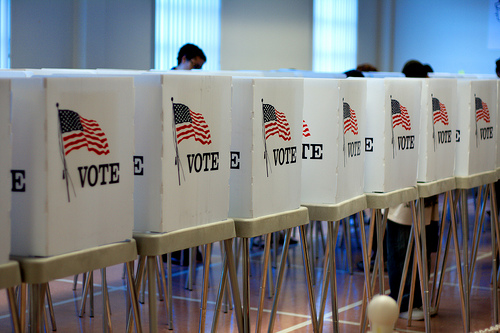Today is the New York
presidential primary! We put together a basic guide for NYLC students
about America’s rather complex presidential nomination process.
In order to become a
presidential nominee, candidates have to win a majority of delegates. Delegates
are won by winning either the majority of votes in the entire state or in specific districts. A Republican needs to win 1,237
delegates to become the Republican nominee, while a Democratic candidate needs to win
2,383. Superdelegates (unelected delegates free to support a candidate of their
choice) are an important factor in the Democratic presidential primary. On the other hand, the
Republican Party does not utilize superdelegates.
These are the types of primaries depending on the state where you live.
Closed Primary:
New York is one of 11
states that have a closed presidential primary. A closed primary means that
voters can only cast ballots for candidates running in the parties that they
are registered in. So only registered Democrats can vote in the Democratic
primary and only registered Republicans can vote in the Republican primary.
Registered Independents and those registered with third-parties (i.g. Green or
Libertarian) will not be able to vote for either Republican or Democratic
Presidential Candidates. Closed primaries are adverse to candidates who have crossover appeal
(i.e. candidates who could get a large number of votes from members of other
parties).
Semi-Closed Primary:
Only unaffiliated
voters and voters registered with the party holding the primary can participate
in semi-closed primaries. An Independent can vote in the Democratic
primary but a Republican cannot.
Open Primary:
An open primary allows
registered voters to cast their ballots for any presidential candidate regardless of party affiliation. Supporters of open
primaries over closed primaries argue that open primaries lead to larger voter
turnout. They also point to the growing percentage of voters who are not
registered to either of the two major parties. Opponents of open
primaries, on the other hand, believe that they lead to the nomination of centrists or broad-appealing candidates, and therefore, more ideologically conventional
candidates will be at a disadvantage.
Semi-open Primary:
Voting is also open to all
registered voters regardless of party affiliation. Upon arrival at the voting
place, however, voters must request a specific party’s ballot, unlike the open primary where the names of all the candidates are on the ballots.
Caucus:
Once the most popular
way of nominating presidential candidates, caucuses are now held in only ten
states and the territories of Guam, American Samoa, and the Virgin
Islands. Caucuses are local gatherings organized by the state or a
specific political party.
 |
| Former candidate, Marco Rubio, at a caucus in Iowa. |
Contested Convention/
Open Convention:
Both Democratic and Republican
parties each hold national conventions at the end of a presidential primary cycle.
Their contemporary purpose is to bring an entire party behind a single nominee
regardless of previous support. A contested convention occurs when no single
candidate has won a majority of the delegates. Contested conventions used to be
common but have become extremely rare in recent decades. Basic rules
about contested conventions are being rehashed in the news because it is
looking increasingly likely that the Republican National Convention (RNC) will
be contested. The last contested RNC was in 1976.
 |
| 2012 Republican National Convention |
The candidates currently running are Ted Cruz, Donald Trump, John Kasich, Hillary Clinton, and Bernie Sanders. U.S. political candidates are often targets of comedic attacks on television. Below are some Saturday Night Live skits spoofing the candidates.
Sources:
http://altoday.com/wp-content/uploads/2015/10/2012-Republican-National-Convention.jpg
http://s.hswstatic.com/gif/caucuses-work-1.jpg
http://www.nationofchange.org/sites/default/files/votingbooth121311.jpg


No comments:
Post a Comment